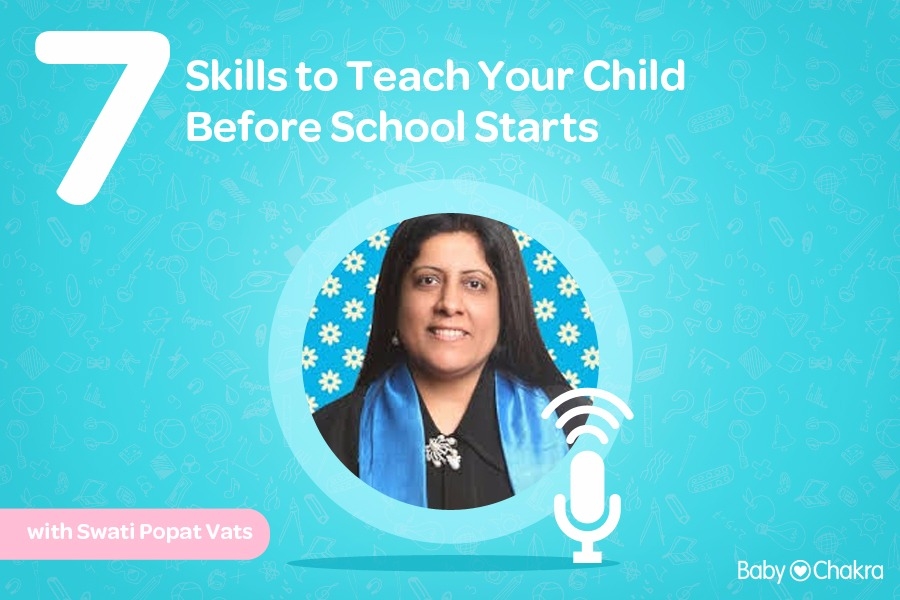
7 Skills to Teach Your Child Before School Starts
5 Sep 2017 | 5 min Read
Babychakra
Author | 1369 Articles
When children join a kindergarten, most parents feel that ‘academic’ learning is the only learning left for children. So they lay emphasis more on rote learning and drill-based activities like writing a letter or number 30 times!
Children pick up life skills everyday and learn from parents the most. So, as parents, you must help your children develop the thinking brain that is in charge of executive functions like goal directed behavior, self-discipline, resisting distractions, working memory, adjusting to change, controlling emotions and the ability to make correct decisions.
Here are some simple activities and ideas that you can do at home and facilitate early learners to become ‘thinking’ learners:
- Estimating time – Help your child develop a daily time table for playing, eating, reading etc. and help them become ‘timekeepers’ using a timer/sand timer. Each time the timer goes off the child knows that it is time to move on to the next part of the daily routine. This helps the child develop an understanding of how every activity is time bound and this cognitive skill of ‘estimating time’ will really help your child later in school and work life. Your child will not have issues of being ‘late’ for anything in life.
- Perspective taking – Empathy or understanding others’ perspective is difficult for young children. That is the main reason that they speak out of turn or make noise when others are talking. So, encourage pretend play with toys like kitchen set, doctor’s set, fireman’s set etc. These toys help children imagine, develop critical thinking and problem solving, by posing different scenarios like, “I would like you to make me a cup of coffee but you don’t have coffee in your kitchen, what will you do?” This way, they learn one of the most important life skills – ‘putting yourself into the shoes of the other person’!
- Focus and Self Control – Ability to focus on tasks and have the self-control to not get distracted is important before formal schooling starts. To develop this, draw patterns on the floor with coloured masking tape – shapes,zig zag, straight, loops etc. Give some small handheld bells to the kids and ask them to hold the bell and walk on the pattern on the floor. The aim is to see that the bell does not shake and ring while walking. This unique Montessori activity helps develop focus and self control, an important executive function of the brain.
- Communication – The ability to understand communication from others and communicate well with others is rather important in today’s life. Give an opportunity to kids to listen to 1/2/3/4/-step instructions. You can do it like a game. Example – “Go and get the red ball and come here and jump twice and then go and keep the ball back ”. Remember, one step instructions for one year olds, two steps for two year olds, three steps for three year olds and four steps for four year olds, most of us cannot remember more than 5 step instructions!
- Cognitive flexibility – Play, ‘Simon Says’ with your child! In school and work life, the daily timetable has different periods/tasks. The kids too, need to switch from reading to math to science. This means that the child’s brain has to switch on and off and move from one thinking format to another. This is called cognitive flexibility, an important executive function of the brain and games like Simon Says, sorting games with changing rules all help develop cognitive flexibility. So help children sort toys into soft and hard, then the same toys into colour categories, then big and small.
- Impulse control – Young children lack impulse control and inhibition is the executive brain function that will help them ‘sit in one place for a longer time’, ‘control the urge to move and talk’ etc. Games like red light, green light, (do the activity when green is shown and freeze when red is shown) and dancing to music and listening to stop and start cues all helps kids develop inhibition and impulse control.
- Ability to defer gratification – This is an important executive brain function that is still being developed in young children. For a school child, it may mean waiting for recess and then eating the snack box! Or, waiting for their turn for different activities. The game of musical chairs helps a lot in developing this skill. In this game, even when the chairs are free, the child cannot sit until the music stops and then has to sit only at a chair close to him and facing him, this is called delaying gratification.
Stressing out your child to rote learn and complete senseless drill activities is not going to contribute to your child’s success. Play these simple games and shape up the learning environment at home and see your children blossom!
Happy Teacher’s Day to every parent!
About the author: Dr Swati Popat Vats is the Director of Podar Jumbo Kids and President of the Podar Education Network. Swati is an educator, author, educational entrepreneur, parenting expert and nature advocate who understands learning as something not restricted to schools but part of everyday living. She is also the President of the Early Childhood Association (India).
Also Read – 10 Life Lessons That Only A Teacher Can Impart To Your Child
A


Suggestions offered by doctors on BabyChakra are of advisory nature i.e., for educational and informational purposes only. Content posted on, created for, or compiled by BabyChakra is not intended or designed to replace your doctor's independent judgment about any symptom, condition, or the appropriateness or risks of a procedure or treatment for a given person.
